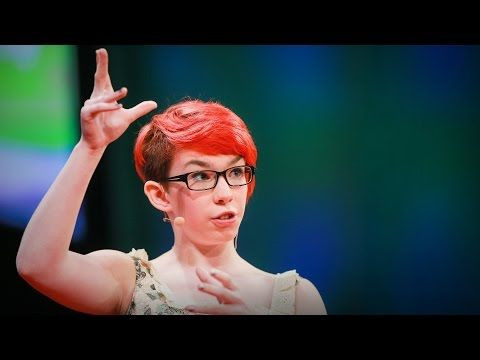TED Speaker Rosie King Explains How Autism 'Freed' Her To Be Herself And Allowed Her To Be Creative

If you never imagined that an autistic person could be one of the most inspiring and eloquent speakers about identity and creativity, then Rosie King is here to prove you wrong. The 16-year-old, who diagnosed herself with Asperger’s Syndrome at age 9 after reading a book about the condition, shatters stereotypes about autism in her TED talk — inspiring not only autistic people, but non-autistic people as well in pursuing their sense of identity and embracing individual “weirdness.”
“When she was 9 years old, doctors confirmed Rosie King’s self-diagnosis of Asperger’s Syndrome,” the TED site states. “With two younger siblings severely affected by autism, Rosie had a burning desire to help make the world a more tolerant place for people with autism ever since she was a young girl.”
As a young girl, King was known to be “a little peculiar,” according to her parents, “but more than anything we thought she was just a sociable and happy child,” they told The Telegraph. Her younger sister Daisy has Kabuki syndrome, a disorder that causes learning and behavioral problems — and her brother Lenny also has autism, but unlike her, he tends to be less talkative.
As a teen, King has blossomed into an eloquent figure in the autism community, one who embraces her condition and sees it as an asset rather than something holding her back. In her TED talk, she describes the notion of “normal” and why it’s backward to place normality on a pedestal.
“Imagine that was the best compliment you ever received, ‘Wow you are really normal,’” she says in the speech. “But compliments are: ‘You are extraordinary, or you step outside the box, [or] you are amazing.’ If people want to be these things, why are so many people striving to be normal? Why are people pouring their brilliant, individual light into a mold?”
She goes on to note that stereotypes about autistic people — and other marginalized groups in society like LGBT — are most often wrong. She also describes the “secret worlds” in her head that tend to be more real than what is happening in real life. It’s a rich imaginary world that allows her to see things in a more creative, open way — more so than people who like to put things in boxes.
“People tend to diagnose autism with really specific checkbox descriptions, but in reality there’s a whole variation as to what we’re like,” she says. “For instance, my little brother is very severely autistic. He’s non-verbal — he can’t talk at all — but I love to talk. People often associate autism with liking math and science and nothing else, but I know so many autistic people who love being creative.”
Watch the rest of her TED talk to see inside her creative mind.



























